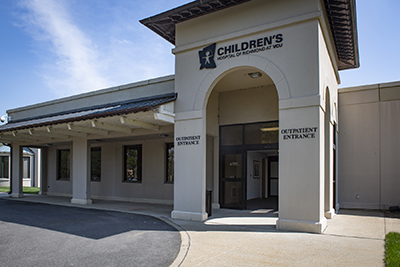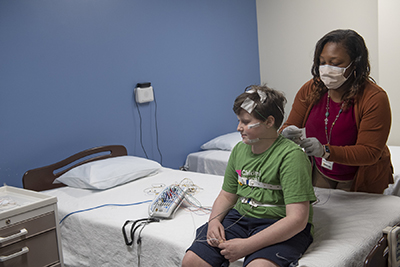Sleep clinic
Sleep clinic: Supporting your child's healthy sleep routine
A good night's sleep is important for everyone, but for kids and teens, it's critical for their developing bodies and brains. If your child is struggling to get enough quality sleep, we can help determine the reasons why and develop a plan to get them on the path to a restful and healthy sleep routine.
Sleep-related conditions we treat
 We care for children with a wide variety of sleep problems, including:
We care for children with a wide variety of sleep problems, including:
- Obstructive sleep apnea
- Infant apnea
- Narcolepsy
- Central hypoventilation
- Frequent night waking
- Insomnia
- Sleepwalking
- Night terrors
- REM sleep behavior disorder (acting out dreams)
- Snoring
- Periodic limb movement disorder (restless leg syndrome)
If you have sleep-related concerns or sleep disorders, talk with your child's doctor to find out if an appointment with a sleep specialist may help.
Why choose CHoR?
- We're home to the only dedicated children's sleep clinic in the region.
- Our services are provided in family-friendly spaces close to home for families who live in Richmond, but we also care for kids from across Virginia and even other states.
- We care for kids - and their parents. Our sleep lab is designed to be comfortable for both children and their parents. The center has private rooms, a family lounge and showers.
- Our team is trained in the art and science of caring for kids. We care for children of all ages - from newborns to young adults, up to age 21.
- Our full team of specialists is available to help support your child's care. Some children with sleep difficulties often require care from multiple specialists - and our whole team is here to support you and your child.
When should you consult a sleep specialist?
Even when parents make every effort to promote good quality sleep, some children still have difficulty falling asleep or staying asleep. Some of these problems can be difficult to identify and correct without professional help.
Consultation with a sleep specialist for your child may be helpful if:
- It takes your child more than a half-hour to fall asleep once in bed with the lights out
- They wake up multiple times at night
- They seem excessively sleepy during the day despite getting the recommended amount of sleep
- They snore, gasp or hold their breath while asleep
What is a sleep study?

A pediatric sleep study is a simple procedure where a number of sensors are attached to different parts of your child's body (head, chest, legs, etc.) to monitor the changes that occur while they're sleeping. The sensors are attached with special skin paste and tape, so it's not painful - no needles required!
Most people find that the sensors don't interfere with sleep, which is exactly what we want so we can assess your child's natural sleep pattern. Sleep studies help us learn a great deal about a child's sleep difficulties. We use this information to make a diagnosis and recommend treatment options.
Scheduling a sleep study appointment
The first step is typically an outpatient visit with a sleep specialist to discuss your concerns. They may then recommend an overnight sleep study to gather more information.
Call us today to schedule an appointment at our pediatric sleep lab at (804) 828-CHOR (2467) or schedule an appointment online.
Sleep study FAQs
Keep bedtime as close to possible within the time frame of the sleep lab hours.
Bring favorite items for bedtime. This might include a storybook, pillow, blanket, medication and stuffed animals.
To become familiar with the surroundings and environment, we encourage you to take a tour of the sleep lab.
Practice equipment (I.e. nasal cannula and mask for titration studies) can be used in preparation to help children become more comfortable and prepare them for the sleep study.
We have parents arrive between 7:30 p.m. and 8:30 p.m. depending on the age of the child, parents' ability to arrive and your child's bedtime. The sleep study is typically over between 6:00 a.m. and 6:30 a.m.
Our sleep technicians are here to help make your child comfortable so they can get as much sleep as possible. After the study, the information obtained is reviewed by your provider to determine if the information is complete enough, or if the study needs to be repeated.
We understand that we cannot predict how children might respond to this situation. If they aren't sleeping at all, we can decide if it is better to cancel the study for that night. A message will be sent to a nurse, the ordering provider and the referring provider to determine the next steps in the plan of care.
We encourage parents and guardians to participate as much as possible until your child falls asleep. We like to set up the environment with low light and minimum noise to prevent the child from waking up once the child is asleep. Parents are free to participate in low energy activities during this time (work, read, sleep, crochet, knit, etc.)
We also have a family lounge if parents need to step away for phone calls or activities that require light and motion.
